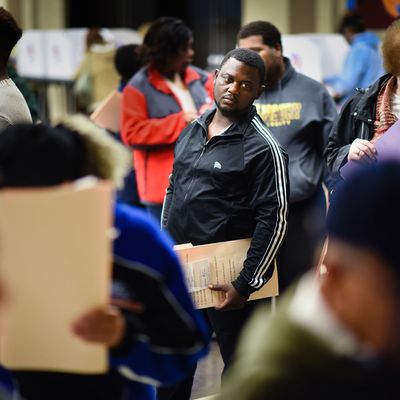
It was apparent immediately after the 2016 election that one factor feeding the Trump win was a drop in African-American turnout from 2012, particularly in states like Michigan that went to Trump narrowly and surprisingly. Now we are getting authoritative election information from Census data, and it is confirming that impression. Here’s a key take from Pew:
The black voter turnout rate declined for the first time in 20 years in a presidential election, falling to 59.6% in 2016 after reaching a record-high 66.6% in 2012. The 7-percentage-point decline from the previous presidential election is the largest on record for blacks. (It’s also the largest percentage-point decline among any racial or ethnic group since white voter turnout dropped from 70.2% in 1992 to 60.7% in 1996.)
A separate analysis from the wonks at the Washington Post’s Monkey Cage blog showed black turnout down between 2012 and 2016 by 12.4 percent in Michigan and 12.3 percent in Wisconsin. Had the various racial groups turned out in 2016 as they had in 2012, concludes the Monkey Cage, Clinton would have won Michigan, Pennsylvania, and Wisconsin — and the presidency.
No one can say lower African-American turnout in 2016 came as a complete surprise; for one thing, as noted above, record highs occurred in 2012. But more obviously, the first African-American president was still on the ballot in 2012 and wasn’t in 2016. Democrats hoped that the presidential contest that developed in 2016 would cushion any post-Obama drop-off in black votes, more because of antipathy to Donald Trump than affection for Hillary Clinton. But a New York Times report from Milwaukee shortly after the election showed significantly less concern about Trump from African-Americans than you might expect and considerably more disenchantment with Clinton and the Democratic Party generally. Other explanations for the turnout drop-off are available, too, including aggressive voter-suppression efforts by Republicans in some states.
The big question now is what to expect in 2018. African-Americans typically don’t turn out as strongly in non-presidential elections as white voters do (though, they do turn out more than Latinos or Millennials). There have been exceptions in heavily racialized elections like one in 1998 that produced three Democratic upsets in three Deep South gubernatorial races. It is possible Trump the president, with his law-and-order Attorney General Jeff Sessions, will be more menacing to African-American voters than Trump the candidate was. Perhaps more importantly, Republicans are now the party of a status quo that has been less than kind to many black families. GOP efforts to cut Medicaid and health-care subsidies for low-income people — not to mention safety-net programs generally — could matter, too.
The particular importance of Barack Obama to black voters may be a unique political dynamic. His ability to galvanize African-American support was a gift to the Democratic Party, but not one that will necessarily keep on giving. The black voting slump in 2016 may wrongly convince Republicans that they don’t need to rid themselves of the aroma of racism to win and keep a national majority, but it should rightly convince Democrats to never take these voters for granted again.






























